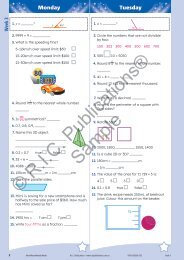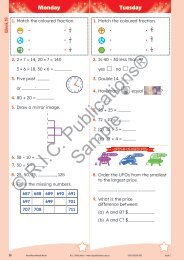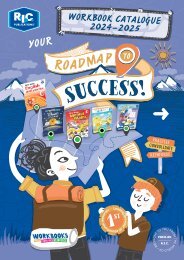RIC-20234 Primary Grammar and Word Study Year 3 – Parts of Speech
You also want an ePaper? Increase the reach of your titles
YUMPU automatically turns print PDFs into web optimized ePapers that Google loves.
<strong>Parts</strong> <strong>of</strong> speech<br />
Nouns<br />
Focus<br />
Collective <strong>and</strong> abstract nouns<br />
Definitions<br />
• Collective nouns are words used to name groups <strong>of</strong><br />
people, animals <strong>and</strong> things.<br />
Example:<br />
crowd, pack, class, bunch<br />
• Abstract nouns are words used to name ideas,<br />
feelings, events or qualities that can not be seen,<br />
heard, smelled, tasted or touched.<br />
Example:<br />
generosity, joy, enlightenment, honesty<br />
Explanation<br />
• A collective noun represents a single group made up<br />
<strong>of</strong> more than one person or a thing; e.g. a committee,<br />
team, or family can not consist <strong>of</strong> one member, at<br />
least two people must compose the unit. They can<br />
be considered singular or plural. When referring to<br />
the collective group, singular tends to be used when<br />
all members <strong>of</strong> the collective noun are doing the<br />
same thing at the same time.<br />
Example:<br />
The team is flying to Melbourne for the finals.<br />
However, when referring to the individual members<br />
<strong>of</strong> the team acting, the plural can be used.<br />
Example:<br />
The team are reconsidering their futures.<br />
• ‘Terms <strong>of</strong> venery’ are collective nouns for types <strong>of</strong><br />
game <strong>and</strong> other wild animals, such as a murder <strong>of</strong><br />
crows <strong>and</strong> a parliament <strong>of</strong> rooks.<br />
• Abstract nouns can be either count (meeting,<br />
experience) or non-count nouns (love, charity).<br />
Worksheet information<br />
• If students have not been previously introduced to<br />
abstract nouns, it will be necessary to introduce<br />
the concept before starting this worksheet. Perhaps<br />
give them a list for a ‘treasure hunt’, such as ‘book,<br />
pencil, paper, happiness, youth’. Students go on the<br />
hunt <strong>and</strong> will finish having been unable to find the<br />
abstract nouns on their list. Explain to them that an<br />
abstract noun is not something that we can touch,<br />
hear, smell or see. It is usually a thought, idea, event,<br />
concept, emotion or feeling.<br />
• Some further examples include: advice, afterthought,<br />
anger, beauty, business, confidence, enjoyment,<br />
freedom, friendship, fun, happiness, health,<br />
help, history, honesty, importance, information,<br />
intelligence, justice, knowledge, law, love, luck,<br />
opportunity, patience, peace, pride, progress,<br />
responsibility, sleep, time, traffic, travel, trouble,<br />
truth, violence, vocabulary <strong>and</strong> wealth.<br />
• Give each student a copy <strong>of</strong> the worksheet <strong>and</strong> read<br />
the explanation <strong>and</strong> examples <strong>of</strong> abstract nouns.<br />
Students select two to write <strong>and</strong> draw a symbol for.<br />
This will reinforce the concept that an abstract noun<br />
can not be seen or touched; they may find it hard to<br />
decide upon an image.<br />
• For Question 2, students write an abstract noun for<br />
each concrete noun.<br />
• To complete the worksheet, students rearrange the<br />
boxes, without changing the order <strong>of</strong> the letters<br />
inside the boxes, to find the collective noun for the<br />
person, place or thing.<br />
Ideas for further practice<br />
• After reading aloud to the students, or shared<br />
reading, ask students to list some <strong>of</strong> the names<br />
<strong>of</strong> any feelings, events, ideas or thoughts the<br />
characters in the story may have had or felt.<br />
• Students paint an abstract noun, using the colours<br />
they feel best represent it. Different paintings <strong>of</strong><br />
the same noun can be presented as simply the way<br />
different people see it, with each representation<br />
having equal value.<br />
• Students investigate <strong>and</strong> create abstract artworks.<br />
©R.I.C. Publications<br />
Low Resolution Images<br />
Display Copy<br />
Answers<br />
1.<strong>–</strong>2. Teacher check<br />
3. (a) a host <strong>of</strong> angels<br />
(b) an orchestra <strong>of</strong> musicians<br />
(c) a string <strong>of</strong> ponies<br />
(d) a quiver <strong>of</strong> arrows<br />
(e) a gaggle <strong>of</strong> geese<br />
<strong>Primary</strong> grammar <strong>and</strong> word study 4<br />
www.ricpublications.com.au R.I.C. Publications ®


















